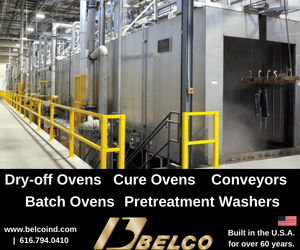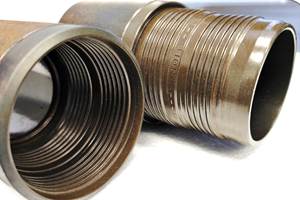Epoxy Rebar Company Reinforcing Roads of the Future
Providing epoxy-coated rebar with the ultimate corrosion resistance is Simcote’s focus for the infrastructure industry it serves.

Epoxy coating is an environmentally friendly, nonhazardous product and is essential for protecting rebar from water and salt produced by vehicles on the road, which can cause rebar rust and corrosion. Source (all photos): Simcote
In the infrastructure industry, where durability, quality and corrosion resistance are paramount, there are only about a dozen U.S. companies that lead the industry in the coating and fabrication of epoxy-coated reinforcing steel. Simcote (St. Paul, Minnesota), founded in 1978, is one of these manufacturers and was in fact one of the first that saw the potential of epoxy coating for reinforcing steel when 3M repurposed technology used in the pipe coating industry during the 1970s.
The 100-employee company solely produced epoxy-coated rebar primarily for the Department of Transportation to build roads and bridges in its first 35 years in business and is still mostly dedicated to the epoxy rebar industry. However, within the last 10 years or so, it has added custom coating to its offerings at its second facility in Marion, Ohio.
Simcote’s main customers, though, are other black bar fabricators or supply houses within the rebar sector. “They are users who are looking for us to supply the epoxy portion of their large concrete reinforcing job,” explains David Simmet, CFO at the company and grandson of the founder. “We focus on partnering with our customers to provide fabricated epoxy-coated rebar delivered straight to their job site that is coated and fabricated to the specifications that they have provided.”
The company’s third location is poised to open soon in Sedalia, Missouri, where it will produce strictly epoxy-coated rebar.
The epoxy process
Epoxy coating is an environmentally friendly, nonhazardous product that, according to Simmet, is the most budget-friendly and sustainable option for corrosion resistance. The epoxy coating technology is essential for protecting rebar from water and salt on the road, which can cause rebar rust and corrosion.

This custom product passes through the company’s Gema powder booth where it is coated with ASTM A775 or A934 powder from a a DOT-approved powder coating manufacturer.
The safe manufacturing process of epoxy coating on straight rebar involves four crucial steps which are typically the same everywhere epoxy coating rebar takes place, Simmet says. However, not every epoxy-coated rebar operation is like Simcote, which fabricates the bars after coating. Some do not offer the fabrication step.
According to Simmet, these are the steps for effective epoxy coating to the specifications of ASTM A775 and A934 for rebar coating and ASTM A1078 for dowel bar coating:
- Surface preparation: The 60-foot bundles of steel bar that are delivered from the mill are blasted with steel grit at high speeds to remove any rust or debris. The blasting process also creates a surface profile necessary for proper epoxy adhesion.
- Heating: The clean bars are heated to the powder manufacturer’s specifications using Ajax and ESC induction heaters.
- Epoxy coating: The heated bars pass through the company’s Gema powder booths where they are coated with ASTM A775 or A934 powder from a DOT-approved powder coating manufacturer (IFS coatings, Sherwin Wiliams and Akzo Nobel), ensuring a uniform and durable green or purple epoxy layer.
- Cooling and fabrication: The coated bars are then cooled via a water quench tank, rebundled and then fabricated on machines that cut and bend the rebar for the required specifications. Each bundle’s unique information is tracked throughout this whole process to ensure proper sourcing and certification information is provided to the end customer.
Epoxy coating nonstandard products
In 2012, Simcote started a small custom coating line for a customer that requested fully epoxy-coated dowel baskets for highway construction. The process gradually evolved to include epoxy coating for large sheets of mesh meeting the guidelines of ASTM A884 and small concrete reinforcing accessories such as rebar couplers, hook bolts, bar supports and transverse bar assemblies.

Simcote solely produced epoxy-coated rebar primarily for the DOT to build roads and bridges in its first 35 years in business and is still mostly dedicated to the epoxy rebar industry. However, within the last 10 years or so, it has added custom coating to its offerings, which includes construction accessories.
Unlike the straight bar line used for coating rebar, products to be custom coated with epoxy go through a more traditional monorail line, Simmet explains. “This coating line resembles a more traditional hanging paint line with a high weight capacity,” he says. “Products are loaded onto hangers, and then go through a large steel grit blaster, an infrared oven to heat the product, then a powder booth and finally a cure oven to cure the epoxy before being unloaded from the monorail.”
The company houses two continuous custom coating lines. The first is dedicated to small rebar accessories with maximum dimensions of 3 ft. by 2 ft. by 15 ft. Its second custom line is ideal for large products with maximum dimensions of 8 ft. 3 in. by 2 ft. by 30 ft.
To aid in tracking customer orders for the custom contract jobs, in 2023, the company partnered with Steelhead Technologies (Calumet Township, Michigan), provider of customizable ERP software. The software has been instrumental in optimizing the custom coating line by clarifying work orders and itemizing costs all the way through the process.
“Steelhead enables the guys in the shop to focus on coating and not worry about tracking data,” Simmet says.
Simcote also owns a coil coating line that enables the epoxy coating of coiled rebar. These are commonly used to create rebar spirals used in concrete columns.
Steel rebar market outlook
Material price fluctuation has been one of the challenges facing the rebar industry in recent years, especially during the COVID-19 pandemic when the price of steel almost doubled, Simmet says. It has since contracted over the last couple years.

This Simcote employee is fabricating epoxy-coated rebar on an automatic bender used to bend the steel and cut it to the customer’s specifications.
Because the steel market is softening, rebar companies like Simcote will be faced with more competition. According to grandviewresearch.com, the steel rebar market in the U.S. is expected to expand at a compound annual growth rate of 5.5% from 2022 to 2030 because of increasing investment by government and private players in the infrastructure segment. Thus, long-term investment in infrastructure projects is projected to boost the demand for steel rebar. It is more difficult to forecast the demand within commercial construction, which has dwindled recently because of higher interest rates.
Although Simmet is aware the steel market is softening, he points out that the most important aspect of a highly volatile market is the increased need for rebar fabricators to be in constant contact with both suppliers and customers to meet the market’s current demands. He adds that it is critical to keep in mind the associated risks when dealing with long-term contracts.
Reinforcing quality
Of the challenges that face Simcote and the rebar industry, Simmet stresses that producing a quality product is the most critical focus. The company fixates on corrosion resistance as the crux of the industry and ensures that its staff is highly trained and skilled in the production of rebar to quality standards.

In addition to its custom coating line, Simcote also owns a coil coating line that enables the epoxy coating of coiled rebar. These are commonly used to create rebar spirals used in concrete columns.
“We have a great team at Simcote,” Simmet says. “A lot of our employees have been doing this for a very long time, are skilled and know the product well. I think that’s one of the reasons we have been around for a long time and are experts in the field. We know what our customers need.”
He recognizes that, unlike some coaters that produce products decorative in nature, rebar coating is about function — with a thicker application of 8-12 mils of coating thickness to keeping moisture and chloride away from the rebar. Ultimately, maintaining high quality standards is Simcote’s role in building bridges that stand the test of time, Simmet concludes.
Related Content
Quick Turnaround is Key for Architectural Coating Shop
This California metal fabricator and coater focuses on fast turnaround and streamlining its processes with 40 years of experience in the construction industry.
Read MoreAromatic Thermosetting Copolyester: Many Forms, Many Uses
As a coating or additive, unique polymer improves bearing wear, protects metals from corrosion under extreme conditions.
Read MoreFinishing Temperature-Sensitive Material with UV Powder Coating
Quality issues with pre-finished components led Global Building Products on a search to discover a new solution for its temperature-sensitive materials.
Read MoreConcrete Reinforced Bars Built to Last
Not all corrosion-resistant materials for infrastructure are created equally. Epoxy-coated steel rebar has advantages that other materials used to prevent corrosion do not.
Read MoreRead Next
Concrete Reinforced Bars Built to Last
Not all corrosion-resistant materials for infrastructure are created equally. Epoxy-coated steel rebar has advantages that other materials used to prevent corrosion do not.
Read MoreNADCAP Shop Digitizes to Eliminate Paper Trail
Customizable ERP software has transformed a 27-year-old manual metal finishing job shop into a state-of-the-art paperless company with full digital traceability in about 10 months.
Read MoreA ‘Clean’ Agenda Offers Unique Presentations in Chicago
The 2024 Parts Cleaning Conference, co-located with the International Manufacturing Technology Show, includes presentations by several speakers who are new to the conference and topics that have not been covered in past editions of this event.
Read More











.jpg;maxWidth=300;quality=90)










